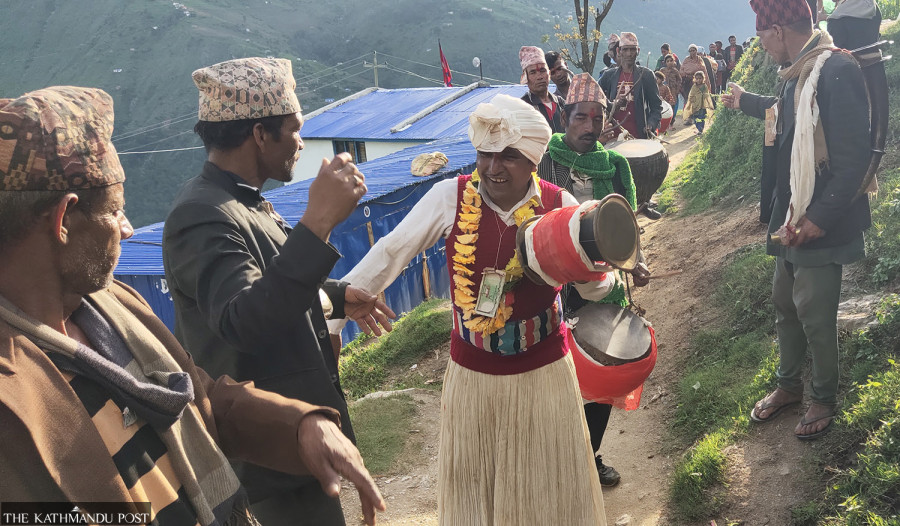Karnali Province
In Kalikot, gender discrimination begins at birth
Despite efforts from social organisations and local authorities to raise awareness on gender discrimination, prejudices against girls are still prevalent.
Tularam Pandey
Three weeks ago, Jaisinghe BK became the proud father of a healthy baby. His joy knew no bounds for his wife had successfully borne him a baby boy on their first try. The 23-year-old resident of Bhaisakhal in Naraharinath Rural Municipality in Kalikot hired traditional musicians to play the Panche Baja to celebrate the occasion.
The musicians led a procession from Kumalgaun-based Primary Health Centre, where the baby was born, to the couple’s home. In the centre of the procession was the new mother, BK’s 21-year-old wife, smiling happily adorned with a garland of currency notes, accompanied by her family members.
“A daughter-in-law who brings a baby boy into the world and our home deserves every bit of pomp and show,” said Manbirey BK, Jaisinghe’s father. “We are going to sacrifice a goat to mark the birth of my grandson.”
When asked if his sentiments would be the same if his daughter-in-law had borne a girl instead of a boy, he said, “It’s not wise to spend money on the birth of a girl.
She is bound to leave us and go away one day. Where is the sense in spending on someone who is destined to look after someone else’s household when she grows up?”
The 53-year-old head of the BK family speaks for most families in rural Kalikot where gender discrimination is still deeply rooted; where the birth of a boy calls for celebrations while a girl child is considered a burden.
The mothers who give birth to girls go through the same discrimination as their daughters.
Twenty-seven-year-old Bimala Bishwakarma of Tadi Dalit settlement in Khandachakra Municipality-4 has five daughters. She has been giving birth every one and a half years in the hopes of bearing a son for her husband, 28-year-old Khadak Bishwakarma. Their youngest daughter is one-and-a-half years old. Bimala is pregnant for the sixth time now.
“My wife is three months pregnant. I want a son to carry forward my legacy. What will I do with so many daughters?” said Khadak. “If Bimala does not give me a son this time, I will bring home another wife.”
Bimala has no say in the matter.
Sapura Bharati, 38, of Baratu in the same municipality has six children—five daughters and a son. She is suffering from serious uterus ailments from having borne many children without getting proper postnatal care.
In the absence of postnatal care for new mothers and negligence toward girl children, women and girls have to live with ill health and malnutrition, say health workers.
A 14-month-old girl of Koligaun in Raskot Municipality died due to acute malnutrition two years ago. The mother of the infant is pregnant again, hoping to give birth to a boy.
According to Katak Mahat, chief of the health service office in Kalikot, malnourishment among children, especially girls, in the district is a case for concern.
“Malnutrition among children is rampant in the remote villages of Dhaulagoha and Khandachakra municipalities,” said Mahat. “Around 70 percent of the malnourished children are girls.”
Khandachakra Municipality health division coordinator Rabindra Sejuwal says the families’ indifference towards new mothers and their girl children is a leading factor behind the high rate of malnutrition among girls in the villages.
“We have introduced programmes to teach the local people to prepare healthy meals and distributed eggs and nutritious flour to new mothers,” said Sejuwal. “But when a girl child is born, the family does not take care of either the mother or the child.”
Most women who fail to bear a son for the family are subjected to physical violence and mental abuse, with a possible threat of eviction from the house. The men in want of a son do not hesitate to bring home another wife while neglecting the one at home.
Gender-based discrimination is the root cause for violence against women, says Sangita Oli, a social worker who has been actively working on the ground in Kalikot with victims of gender-based violence.
“Women are the victims of child marriage, polygamy, non-consensual marriage and several other evil practices,” Oli told the Post. “After marriage, they become victims of violence at the hands of their husbands if they fail to bear a son.”
According to the District Police Office in Kalikot, 36 complaints of violence against women were registered in the past year with cases of domestic disturbances reported every day.
Bhupendra Shahi, information officer at the police office, said, “Despite efforts from social organisations and local authorities to raise awareness among the local population about the ills of gender-based discrimination, instances of husbands abusing their wives and seeking a divorce for failing to give birth to a boy go unabated.”
The prejudice against girls begins at birth and continues onto their adult life. They are neglected as infants and are not being given equal opportunity in education and other sectors of their life.
But the discrimination against girls does not begin and end with poor families with little education, says Taran Bahadur Shahi, mayor of Tilgufa Municipality. It is in fact equally practised in well-to-do educated families, he says.
“Around 80 percent of the so-called educated families send their sons to a boarding school while their daughters are sent to public ones,” said Shahi. “I enrolled my son, who was studying in a boarding school in Surkhet, to a public school in the municipality to set an example for others. However, many employees of the municipal office and people’s representatives are discriminating against their daughters.”
The rate of girls being married off before the legal age of 20 is also high in the district, according to Prakash Shahi, a child rights activist in Kalkot.
According to him, marriages of children between 12-15 years of age have gone down in recent years but 62 percent of the total marriages in the district accounts for marriages of those under the age of 20.
“Girls constitute 80 percent of the underage marriage cases,” said Shahi.
Although some rural municipalities in Kalikot have formed ‘girls groups’, where young girls work towards raising awareness against gender discrimination, they have not been effective in ending the prejudices against girls.
Manshova Budha, vice chairman of Naraharinath Rural Municipality, points out poverty and a lack of education and awareness as the main reasons behind the prevalence of gender-based discrimination in Kalikot.
“The younger generation is more aware of the evils of gender-based discrimination and orthodox customs. However, the older generation is yet to let go of their biases,” said Bijaya Bista, the deputy mayor of Khandachakra Municipality.
Bista informed that the municipality, in an effort to minimise gender discrimination, had introduced a campaign wherein couples opting for family planning measures after the birth of two girls were offered Rs100,000.
“It has been one year since we introduced the policy, and no one has come to claim the amount so far,” she said.
But for Khadak Bishwakarma, Bimala’s husband, family planning is not an option, at least not until his wife bears him a son.
“Having a son is important to me for posterity. He will carry the family lineage forward,” he said. “I have no use for daughters.”




 13.12°C Kathmandu
13.12°C Kathmandu












